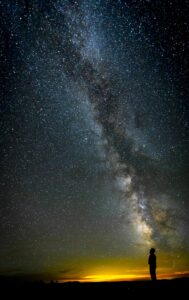We finally had a string of clear nights after what seemed like weeks of clouds and cold rain. Sunshine is nice, but what I was waiting for was the joy of seeing bright stars sparkling against a black backdrop again.
The Outer Cape is blessed with a fairly dark sky. Depending on the time of year, you can see the Milky Way spanning the sky, shooting stars, and constellations glimmering with their full complement of stars. But the world’s population keeps growing. And as we build more roads, houses, parking lots, and commercial areas, we install more lights. The sky, even here, gets a little less dark every year. One by one, the faintest stars vanish from our sight.
But hope is not lost. Right now, there are people working to reduce light pollution, including right here.

The rangers and staff of the Cape Cod National Seashore recognize our dark sky as a treasure no less worthy of conservation than the fragile dunes and salt marshes. Lauren McKean, a planner with the Seashore, says there is a national night skies team at the Park Service dedicated to mitigating light pollution and preserving dark skies.
McKean and a few of her Seashore colleagues recently got funding through a program run by the Park Service’s stewardship and science directorate that will allow them to replace existing light fixtures in the Park with new dark sky-friendly fixtures designed to minimize or even eliminate glare and light trespass — two forms of light pollution. These will be installed in the Seashore over the next two to three years.
Local select boards could take inspiration from what the Seashore is doing. Codes regarding outdoor illumination can have a powerful effect on local light pollution. For example, towns could decide to use fully shielded fixtures (which prevent glare and light spreading up into the sky) in all municipal lighting and to set limits regarding light trespass on private property.
Of course, anyone advocating for policies like this must do so carefully and respectfully. Your neighbors might not be aware of light pollution issues and could worry that you’re asking the select board to come for their porch lights. The first step is raising awareness: informing people about what light pollution is, the benefits of mitigating it, and feasible ways to do so.
DarkSky International, a nonprofit dedicated to preserving the night sky, is one place to go for a better understanding of facts and issues. Its website offers many useful, easy to understand summaries and other resources for working with local governments and other citizens. The organization even has delegates whom you can contact for help in grassroots efforts. In the U.S., there are delegates in nearly every state, including Massachusetts.
Individuals do have the power to make positive changes. How about your current outdoor light fixtures? Do they cause glare or spill light upwards? Glare defeats the intended purpose of the light fixture, reducing rather than increasing visibility, and spill is simply wasted light that contributes to sky glow.
Consider replacing them with dark sky-friendly fixtures. DarkSky International has lists of fixtures that they’ve certified as reducing light pollution as well as guides to what design features to look for. You could also add motion detectors so that certain lights turn on only when needed. Timers can also help reduce wasted light.
Dimming outdoor lights is another strategy to try. Counterintuitively, more illumination does not always equal improved visibility. This is because of contrast, the difference between the brightest and darkest levels of illumination. Your pupils respond to bright light by contracting, so you can then see in the brightly lit area beneath the driveway light, for example, but because of the high contrast between light levels, anything in the darkness beyond becomes invisible. Dimming the lights allows your pupils to dilate, which improves visibility over a wider range of illumination levels.
Once you’ve installed some dark sky-friendly upgrades, you’ll probably find that you can actually see better at night around your driveway and yard. And you’ll see more stars over your house than you could in the glare of the older fixtures. You might even inspire your neighbors to change their own fixtures.
There’s also a local organization that cares deeply about dark skies. The Cape Cod Astronomical Society is a group of amateur astronomers based in Yarmouth. They offer public observing events with science ambassadors eager to show you what’s in the sky that night (despite any sky glow) through a variety of impressive telescopes. They also work with local schools.
Delving into dark skies over these last few months, I’ve learned about the negative health effects of light pollution on people as well as on wildlife. Reducing these harmful effects is important. But the most obvious reason to protect a dark sky is the aesthetic. I’ve never met anyone unmoved by the stars or indifferent to encroaching light pollution. I like to think that preserving our dark sky is something everyone can agree on. Clear skies!



